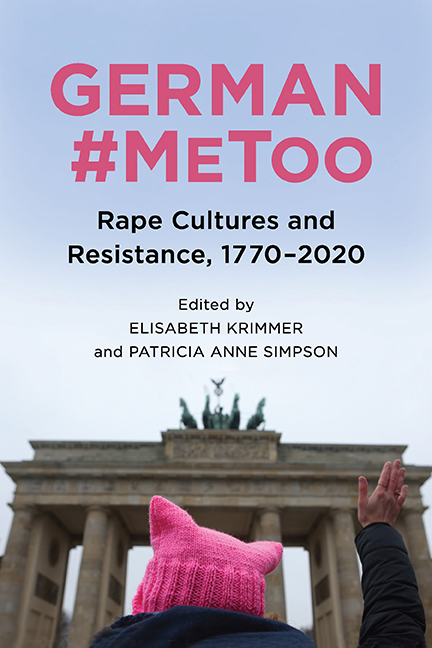8 - #MeToo and Wartime Rape: Looking Back and MovingForward
Published online by Cambridge University Press: 08 October 2022
Summary
A FUNDAMENTAL ASSUMPTION of memory studies is the ideathat collective remembrance is a highly mediatedversion of “history-in-motion,” which “remak[es] theresidue of past decades into material withcontemporary resonance.” The recent graffitiing ofSeward Johnson's sculpture Unconditional Surrender offers apertinent example of this process of recasting.Modeled on the iconic photograph by German-Jewishemigre Alfred Eisenstaedt, the statue depicts USNavy sailor George Mendonsa passionately embracing apliant nurse on September 2, 1945. This image wasinitially celebrated as a visual encapsulation ofthe joy of VJ Day; in 2005, however, anAustrian-Jewish refugee named Greta Zimmer Friedmanidentified herself as the photographed woman andrevealed that the kiss had not been consensual. Thisdisclosure cast the title of Johnson's work in a newlight, exposing the extent to which women's sexualpassivity and the fine line between consent andcoercion are naturalized—if not romanticized anderoticized in Western cultures. It took #MeToo todisturb the narrative. When Mendonsa's death inFebruary 2019 was widely reported in obituaries, aprotestor sprayed the Sarasota statue with the words“#MeToo.” This graffito embodied the work's alteredstatus as feminist cipher for “the normalization ofassault.” Conversely, the fact that localauthorities categorized the #MeToo tag as vandalismand removed it suggests the difficult entanglementof sexual politics and history with nationalidentity.
Several scholars have considered the memorial dynamicsat the heart of #MeToo. For instance, Laura Moisianalyzes the “temporal engagement” integral to thepublic sharing of stories, which she calls a form of“navigating the past with the tools (words,concepts, ideas) of the present.”5 This chaptercontributes to such discussions by specificallyexamining how #MeToo has the potential to shift ourunderstanding of history. First, I elucidate therelevance of the past to debates and scholarshipunder the sign of #MeToo and discuss the extent towhich historicization has been used to downplay thesystemic dimensions of rape culture in the present.Part 2 of this chapter explains the implications ofsuch historical thinking for how Germany remembersits history of sexual violence, especially in thecontext of World War II.
- Type
- Chapter
- Information
- German #MeTooRape Cultures and Resistance, 1770-2020, pp. 197 - 216Publisher: Boydell & BrewerPrint publication year: 2022

